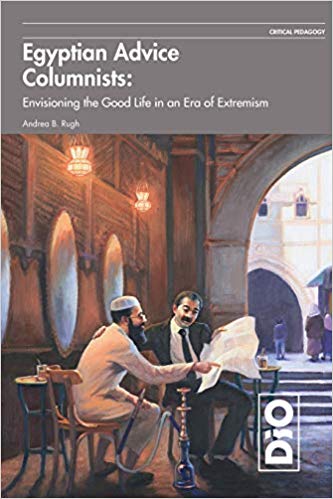By Andrea Rugh | –
Recently an article by N. A. Hussein, “No Money; No Marriage” highlighted the costliness of marriage in Egypt. A problem long in the making, social issues like this rarely reach public attention until they are full blown crises. In this case, young men are calling for a boycott of marriage until the families of prospective brides lower their financial expectations.
Why does it take so long for such issues to reach the public’s attention? Are we so enamored with political and economic trends that we ignore issues affecting individuals? Or, in this case, are we so focused on women’s problems that we neglect the social burdens imposed on men? Is it simply too difficult to extract personal data in some sort of systematic way? Ultimately for social policies to work we need good data at the personal level.
My new book

Egyptian Advice Columnists: Envisioning the Good Life in an Era of Extremism
takes a fresh look at personal issues in the volatile period of the 1980s just after Sadat’s assassination and as extremism was escalating in Egypt. The book analyzes 200 advice columns published in various newspapers. The columns were of two types–ones written by a self-described humanist, Abdul Wahab al-Mutawa, and the others mostly by religious scholars trained by or affiliated with Al-Azhar University.
Abdul Wahab’s columns compare with Ann Landers-style columns in US papers where a writer describes a personal problem and the columnist answers. The Egyptian letters however go into far greater detail in describing problems—sometimes covering the entire back page of Friday’s Al-Ahram newspaper–and Abdul Wahab addresses the “letter-writers’ pain” more comprehensively. Inevitably his solutions rely on recognizable Egyptian traditions.
The religious columns were of course quite different in format and approach. They mostly responded to questions about Islamic views of practice—whether behaviors were recommended, permissible, neutral or reprehensible. Often the issues were ones made ambiguous by modern life and not totally clear in religious sources. Scholars frequently elaborated their rationales for arriving at specific interpretations. But once determined, believers should follow them, for the scholars believed they exclusively were authorized by their training to determine the true meanings.
As with any good social data-base, advice columns provide a useful entry into a much broader understanding of society. Abdul Wahab’s columns tell us, for example, that men, as the majority of letter-writers, were feeling the greatest stress of social obligations largely where financial responsibilities were concerned. Almost invariably they were government employees with wages insufficient to meet their support roles.
Abdul Wahab noted that marriage age at the time had increased greatly because “when men are in school and can meet appropriate women, they don’t have the resources to marry, and when they finally amass the money they need, they have difficulty finding a mate.” The affordability of marriage is still a problem in 2019 and, if anything, has increased. Abdul Wahab held what he called “Red Agenda Nights” where he connected benefactors with individuals needing jobs or marriage partners. Indirectly, by showing the ease with which such problems could be solved, his actions highlighted the inadequacy of government organization.
Where women wrote to the columnists, their complaints were not about enrolling in education programs or finding jobs, the issues that conventional wisdom said were women’s issues in the 1980s. Instead they complained about personal relations among family members, especially those related to spousal obligations.
The columns therefore in the 1980s were already identifying points of personal stress and offering traditional social and religious solutions. Although the letter-writers never linked their own problems directly to larger social and political trends, the columnists wrote in ways that showed they were aware of the trends. Both types of columnist, for example, embedded messages critical of extremists in their columns, taking an implicit rather than explicit approach out of fear of sparking the kinds of retaliation that were common at the time. The religious columnists had the most to lose in a competition for the hearts and minds of the religiously observant.
On one side, they had to project strict enough observance to compete with the radicals, while on the other they were careful not to offend. An element of the tension that was intensifying in the 1980s and is still present today was the disagreement between Al-Azhar and the government over Al-Azhar role in moderating extremism. The kernels of the dilemma were already visible in advice columns as Al-Azhar scholars tried to position themselves as the authentic voice of Islam without becoming simply a mouth piece for government policy.
Then as now Al-Azhar weighs in on all controversial matters, and not surprisingly, as Al-Monitor reports, finds the recent youth-inspired ban on marriage un-Islamic.
Andrea Rugh has been a technical advisor for USAID development projects in the Middle East, South Asia, and Africa. Sheworked for Save the Children and UNICEF in Pakistan and Afghanistan from 1998 to 2002. Her latest books are The Political Culture of Leadership in the United Arab Emirates (Palgrave-Macmillan 2007), Simple Gestures: A Cultural Journey Into the Middle East (Potomac Books 2009), International Development in Practice: Education Assistance in Egypt, Pakistan, and Afghanistan (Palgrave-Macmillan 2012) and Christians in Egypt: Strategies and Survival. (November 2015-Palgrave Macmillan).


 © 2025 All Rights Reserved
© 2025 All Rights Reserved